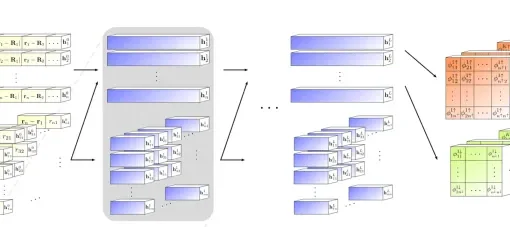
DeepMind uses neural networks to tackle Schrödinger equation
Quantum Chemistry Breakthrough: DeepMind Uses Neural Networks to Tackle Schrödinger Equation.

Quantum Chemistry Breakthrough: DeepMind Uses Neural Networks to Tackle Schrödinger Equation.
Methods of processing quantum data become more important as quantum computing devices improve their quality towards fault tolerant universal quantum computers. These methods include discrimination and filtering of quantum states given as an input to […]
Alpine Quantum Technologies (AQT) and the University of Innsbruck provides direct access to their ion-trap quantum computer via Cirq, a framework developed by Google focused on developing and implementing quantum algorithms. Cirq can be used […]
Researchers at Dutch Centrum Wiskunde & Informatica (CWI) focus on a type of classic algorithm called a random walk algorithm. Random walk algorithms are used when a computer is looking for something but doesn’t know […]
BASF and HQS Quantum Simulations, both German companies, collaborates in quantum chemistry for prediction of chemical reactivity. They used the hybrid quantum-classical variational quantum eigensolver algorithm in combination with the unitary coupled-cluster ansatz (UCCSD-VQE) that could provide […]
Machine learning algorithms perform well on identifying patterns in many datasets due to their versatility. However, as one increases the size of the data, the time for training and using these statistical models grows quickly. […]
Researchers at Harvard University recently developed a quantum circuit-based algorithm inspired by convolutional neural networks (CNNs). This new technique is therefore called Quantum Convolutional Neural Network (QCNN). The team found a connection between two characteristics of CNNS […]
The evolution of a quantum system is governed by the associated Hamiltonian. A system defined by a parameter-dependent Hamiltonian acquires a geometric phase when adiabatically evolved. Such an adiabatic evolution of a system having non-degenerate […]
The researchers team reports their work on the Alibaba Cloud Quantum Development Platform (AC-QDP). They demonstrate with figures how AC-QDP helps in testing large-scale quantum algorithms (currently within the QAOA framework). They give new benchmark […]

NIST (US National Institute of Standards and Technology) has enlisted researchers from academia and private industry to get quantum-resistant cryptography ready for 2022. The agency is overseeing the second phase of its Post-Quantum Cryptography Standardization Process to narrow down the […]
IBM has just launched the Qiskit Advocates Program, a global program that provides support to the individuals who actively contribute to the Qiskit Community. Advocates will receive special access to core members of the Qiskit […]
Delft University researchers presented an interesting paper (A Link Layer Protocol for Quantum Networks) at the recent ACM SIGCOMM conference regarding the challenges of building a quantum communication network stack. Effective quantum networking needs a robust networking […]
IBM Q has announced a series of new quantum computing tools and technology: additions to the IBM Q Experience hardware with 5-qubit quantum computers, a university hackathon partner program, a series of video tutorials teaching […]
Researchers at Linköping University have shown how a quantum computer really works and have managed to simulate quantum computer properties in a classical computer. “We have shown that the major difference is that quantum computers […]
CaixaBank has completed several real tests with a quantum computer to study financial applications to assess the capital at risk of financial assets, such as mortgage portfolios and treasury bonds. The Spanish bank used the […]
Fujitsu announces the successful conclusion of a loan portfolio management Proof of Concept (PoC) with Commerzbank’s research and development unit, Main Incubator, leveraging the Fujitsu quantum computing-inspired Digital Annealer. The PoC focused on the selection […]

Researchers from the Université Paris Diderot develop the first quantum algorithm for the constrained portfolio optimization problem.
Finding a maximum or minimum is a fundamental building block in many mathematical models. Compared with classical algorithms, Durr, Hoyer’s quantum algorithm (DHA) achieves quadratic speed. However, its key step, the quantum exponential searching algorithm […]
Researchers from Lawrence Livermore National Laboratory (LLNL) have developed a new algorithm for solving polynomial systems of equations using a type of quantum computer called a quantum annealer. This study provides evidence that quantum annealing could […]
A team of University of Sheffield in the UK could speed up the simulation of certain molecules using a random, not deterministic, sequence of operations. It may outperform other approaches when a molecule’s energy is […]
Fujitsu knows that quantum is the way to go, but at the moment they can’t do it at a mass scale. So they use a Digital Annealer which is not actually quantum but ‘quantum like’. […]
Researchers at Virginia Tech Chemistry and Physics have advanced Quantum simulation by devising an algorithm that can more effectively calculate the attributes of a molecule being tested. The most important use will be simulating the […]
A new algorithm will allow quantum computers to investigate how the classical world emerges from the quantum world. Los Alamos National Laboratory researchers have developed a new quantum computing algorithm to better understand the quantum-to-classical […]
Google wants to make the quantum programmer life easier with its new open-source software. Developers may better experiment with the quantum machines, including Google’s own super-powerful quantum processor. (MIT Technology Review)
Researchers have developed hybrid algorithms to run on size-limited quantum machines. They used decomposition methods to break the problem down into smaller pieces that the quantum computer could manage. (DOE/Argonne National Laboratory) Read more.
